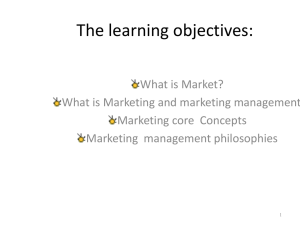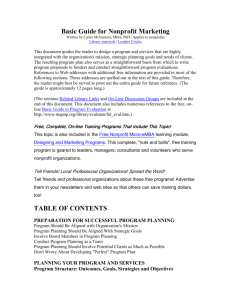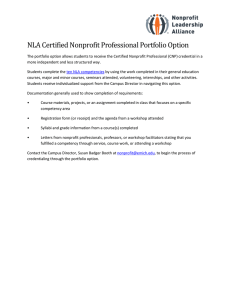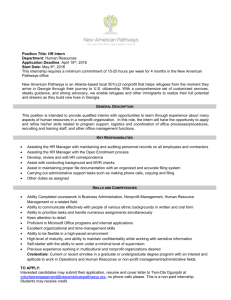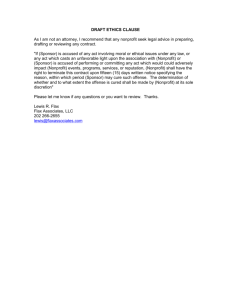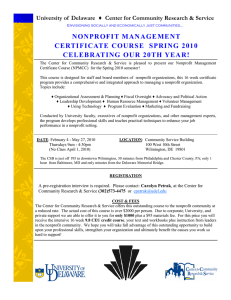PLS 605: Leadership and Nonprofit Management Winter 2015 Time: 6-8.40 PM, Wednesday
advertisement
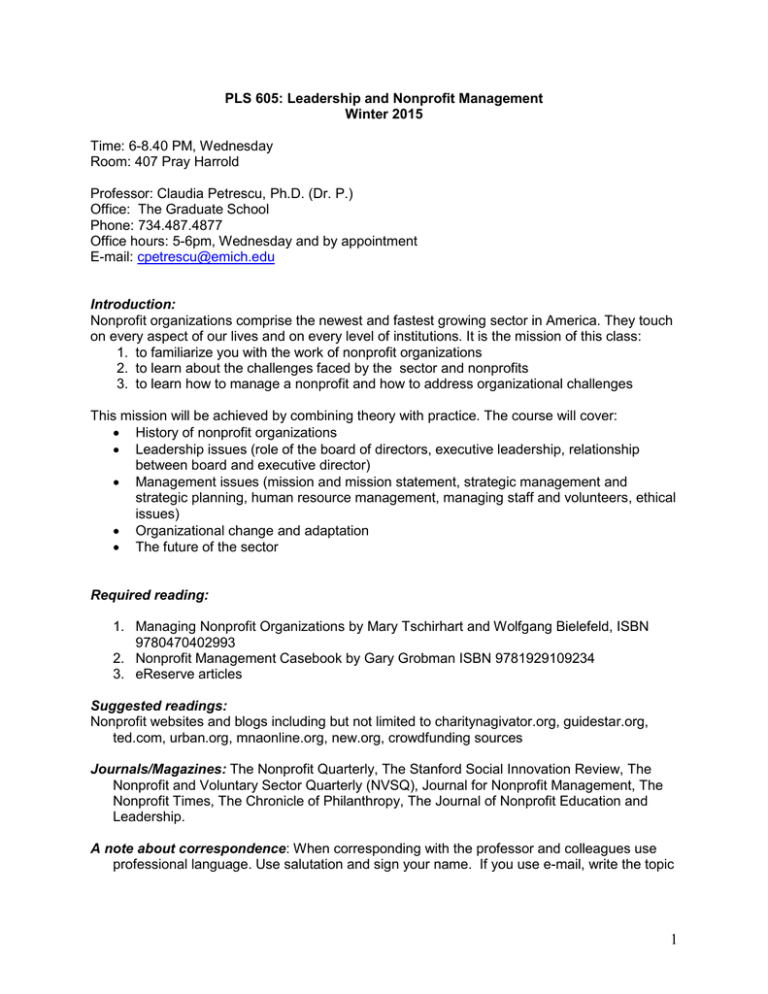
PLS 605: Leadership and Nonprofit Management Winter 2015 Time: 6-8.40 PM, Wednesday Room: 407 Pray Harrold Professor: Claudia Petrescu, Ph.D. (Dr. P.) Office: The Graduate School Phone: 734.487.4877 Office hours: 5-6pm, Wednesday and by appointment E-mail: cpetrescu@emich.edu Introduction: Nonprofit organizations comprise the newest and fastest growing sector in America. They touch on every aspect of our lives and on every level of institutions. It is the mission of this class: 1. to familiarize you with the work of nonprofit organizations 2. to learn about the challenges faced by the sector and nonprofits 3. to learn how to manage a nonprofit and how to address organizational challenges This mission will be achieved by combining theory with practice. The course will cover: History of nonprofit organizations Leadership issues (role of the board of directors, executive leadership, relationship between board and executive director) Management issues (mission and mission statement, strategic management and strategic planning, human resource management, managing staff and volunteers, ethical issues) Organizational change and adaptation The future of the sector Required reading: 1. Managing Nonprofit Organizations by Mary Tschirhart and Wolfgang Bielefeld, ISBN 9780470402993 2. Nonprofit Management Casebook by Gary Grobman ISBN 9781929109234 3. eReserve articles Suggested readings: Nonprofit websites and blogs including but not limited to charitynagivator.org, guidestar.org, ted.com, urban.org, mnaonline.org, new.org, crowdfunding sources Journals/Magazines: The Nonprofit Quarterly, The Stanford Social Innovation Review, The Nonprofit and Voluntary Sector Quarterly (NVSQ), Journal for Nonprofit Management, The Nonprofit Times, The Chronicle of Philanthropy, The Journal of Nonprofit Education and Leadership. A note about correspondence: When corresponding with the professor and colleagues use professional language. Use salutation and sign your name. If you use e-mail, write the topic 1 of your correspondence in the subject line and don’t forget to use spell-check. Write an email just like you write a letter – professionally! Assignments: 1. Interviews of professionals. Each student will choose at least three nonprofit board members and/or nonprofit professionals to interview regarding: a. Class related topics. Examples of topics: management of a nonprofit organization/program, relationship executive director- board, strategic planning, program evaluation and decision making, volunteer management, organizational change. b. Jobs in the nonprofit sector; the challenges and benefits of working in/volunteering in/managing a nonprofit. A paper summarizing the findings of the interviews will be submitted at the end of the semester. The paper should be 3-5 pages in length, double spaced. 2. Case studies: The case study will be discussed in class. You must read the case studies prior to coming to class! 3. Research paper: a) Each student will select a nonprofit management topic to research. b) The topic will have to be approved. c) Each research paper will need to have at least 10 distinct sources of reference, with at least 8 sources from peer reviewed academic journals 4. Research Paper Presentations During the final weeks of the term students will make formal 10-15 minute professional presentations of their research paper and interview with professionals. Opportunity (competitive): as replacement for Assignment 1 (Interview with Professionals), 12 students will be given the opportunity to participate in the Student Funders’ Group project. Through this project, students will work in collaboration with NLA students and other nonprofit students to award $5000 to nonprofit organizations in a determined geographical area. Students will: Identify a need in the nonprofit community (e.g. capacity building, nonprofit training) Write a request for proposals (RFP) Identify organizations to send the RFP to Collect, read, analyze RFP Select best RFPs. Learn what makes a good proposal and about fundraising Award organizations Grading*: Midterm exam: 20% Final exam: 20% Research paper: 35% Presentation of Research paper and Interview with professionals: 15% Interview of Professionals (paper): 10% 2 Grading will be based on quality of work and not quantity. Papers are due at the beginning of the class. Late papers will be accepted only for extraordinary circumstances and only if approved in advance by the instructor. *The Professor reserves the right to change the grading structure during the semester. Behavior expectations: Classroom conduct: Students are expected to abide by the Student Conduct Code and assist in creating an environment that is conducive to learning and protects the rights of all members of the University community. Incivility and disruptive behavior will not be tolerated and may result in a request to leave class and referral to the Office of Student Judicial Services (SJS) for discipline. Examples of inappropriate classroom conduct include repeatedly arriving late to class, using a cellular telephone, or talking while others are speaking. Use of computers is allowed, but only for class purposes. You may access the Code online at www.emich.edu/sjs. University Policies: Students With Disabilities: If you wish to be accommodated for your disability, EMU Board of Regents policy #8.3 requires that you first register with the Disability Resource Center in 204 Student Center, (734) 487-2470. Students with disabilities are encouraged to register with the DRC promptly as you will only be accommodated from the date you register with them forward. No retroactive accommodations are possible. Notice to all foreign students (F and J visa): To comply will all federal regulations, please contact the EMU office of International Students (OIS), 244 EMU Student Center, 734.487.3116 Academic Honesty: Each student in class is expected to adhere to the highest standards of academic honesty. Cheating and plagiarism violate the rules of the University and the ethical standards of professional public administration. Cheating and plagiarism will be punished to the full extent allowed by University rules and regulations. Plagiarism is generally defined in your student handbook as presenting as your own work that done by someone else, even if only an idea and/or not quoted directly. Cite, quote, and when in doubt, ask the instructor. Those caught cheating will be given a zero for the work in which the cheating occurred. Possible plagiarism will be dealt with on a case-by-case basis. In addition, you may be referred to the Office of Student Judicial Services for discipline that can result in either a suspension or permanent dismissal. The /Student Conduct Code/ contains detailed definitions of what constitutes academic dishonesty, and it can be accessed online at www.emich.edu/sjs Observance of Religious Holidays University Policy: Eastern Michigan University recognizes the rights of students to observe religious holidays without penalty to the student. University Practice: Students will provide advance notice to their instructors in order to make up work, including examinations that they miss as a result of their absence from class due to observance of religious holidays. If satisfactory arrangements cannot be made with the appropriate instructor(s), students may appeal to the head(s) of the department(s) in which the course(s) is/are offered. There are many resources on line regarding the observance of religious holidays; here is one site with an extensive listing of holiday dates: http://www.interfaithcalendar.org/2015.htm 3 Class schedule*: * The schedule may change based on the pace of the class and university closings. Any changes will be announced at least one week in advance. Week 1: January 7. Introduction to Nonprofit Organizations and Ethics Course Orientation Review Syllabus and Create Class Roster Sheet Tschirhart and Bielefeld: chapters 1 and 2 Week 2: January 14. Leading and Managing: Board and Executive Director Tschirhart and Bielefeld, chapters 9 and 10 Grobman case study: Case 6: Evaluating Dr. Luddite Week 3: January 21: Founding nonprofits and organizational structure Tschirhart and Bielefeld: chapters 3 and 4 Grobman case study: Case 2: I Choose to Live Foundation Week 4. January 28. Strategy formulation Tschirhart and Bielefeld: chapter 5 Grobman case study: Case 3: Cutting the Budget of Harristown Family Services Due: Research topic Week 5. February 4. Resource and Financial Stewardship Tschirhart and Bielefeld: chapters 6 and 7 Grobman case study. Case 4: HHA’s Dilemma: To be a good citizen or fight extortion Week 6. February 11. Marketing Tschirhart and Bielefeld: chapter 8 Grobman case studies. o Case 8: Gambling on an outside fundraising consultant. o Case 11: Public relationships dilemma Midterm exam is handed out. Week 7. February 18 – No class. Day for Interview of Professionals February 22- February 27: Mid-winter break. Week 8: March 5 Tschirhart and Bielefeld: chapters 11 and 12 Grobman case study: Case 10: The Disruptive Board member Midterm exam DUE Week 9: March 12 Tschirhart and Bielefeld: chapter 13 4 Week 10: March 19 Tschirhart and Bielefeld: chapters 14 and 15 Grobman case study: Case 12: Approving a partnership agreement Week 11: March 26 Tschirhart and Bielefeld: chapters 16 and 17 Week 12: April 1: Presentations Research paper DUE Interview with Professionals paper DUE Week 13: April 15 Summary of class: Class exercise Final exam is handed out April 22: Final exam DUE by 6pm. E-mail paper to Dr. Petrescu (cpetrescu@emich.edu) either as a PDF or Word document. ENJOY THE CLASS! 5

